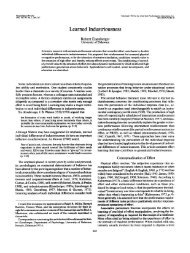Perceived Organizational Support
Perceived Organizational Support
Perceived Organizational Support
You also want an ePaper? Increase the reach of your titles
YUMPU automatically turns print PDFs into web optimized ePapers that Google loves.
Coyle-ch10.qxd 1/16/04 3:00 PM Page 208<br />
208 Exchange Nature of Employment Relationship<br />
Thus, the organization’s discretion is important for determining the extent to<br />
which different treatments most impact POS. For example, union workers might<br />
receive excellent wages and benefits. However, if these benefits resulted from difficult<br />
contested negotiations, employees would consider the benefits to have been provided<br />
involuntarily, and the benefits would have little influence on POS. This suggests that<br />
organizations should not automatically conclude that well-treated employees will<br />
have high POS. Favorable treatments that organizations provide to employees must<br />
be perceived as voluntary if they are to influence feelings of support. To the extent<br />
that the organization effectively conveys favorable treatment as discretionary, POS<br />
will be enhanced.<br />
Correspondingly, unfavorable treatment that is perceived to be beyond the<br />
organization’s control will have a less negative effect on POS. For example, management<br />
could attribute lower annual pay raises to low profits associated with weak<br />
economic conditions. By shifting the responsibility for the cutbacks from the<br />
organization itself to external circumstances over which the organization had little<br />
control, the deleterious effect of the cutbacks on POS would be reduced.<br />
The importance of the discretion attribution for employees’ attitudes toward the<br />
organization has practical implications. In extensive consulting with a large retail<br />
sales organization, we found that most salespeople reported a high level of stress<br />
at work. When we investigated more closely, we found these employees generally<br />
attributed their stress to the nature of sales jobs, leading them to believe that there<br />
was little that the organization could do to alleviate the stress. Because stress was an<br />
aspect of the job that employees believed the organization could not control, the sales<br />
employees’ POS was not adversely affected by this unfavorable job condition.<br />
According to the sales employees, improvements in other features of the job that the<br />
organization could control, such as more weekend days off and higher pay, were<br />
more important to them. Thus, some unpleasant aspects of one’s job are taken for<br />
granted by employees and not blamed on the organization. Employees are practical;<br />
they are generally concerned with improving working conditions and benefits that<br />
management can readily change.<br />
The literature on social accounts (Sitkin and Bies 1993; Cobb and Wooten 1998)<br />
suggests additional ways in which organizations may cast negative treatment of<br />
employees in a better light and thereby minimize the loss of POS. Organizations may<br />
legitimize their actions with exonerating accounts that appeal to higher-order norms<br />
and values or they may use reframing accounts which alter employees’ perceptions of<br />
the unfavorableness of the treatment.<br />
One type of exonerating account attempts to make salient superordinate goals and<br />
values. For example, an employee who is asked to work unwanted overtime may be<br />
told how important his or her contribution is for meeting a specific objective<br />
to which the entire work group is contributing. Of course, the invocation of shared<br />
sacrifice by management for the greater good of the organization is likely to be<br />
greeted cynically if management does none of the sharing.<br />
Exonerating accounts may also be used to take advantage of the proclivity of<br />
individuals to accept unintended consequences of well-meant actions (Sitkin and



